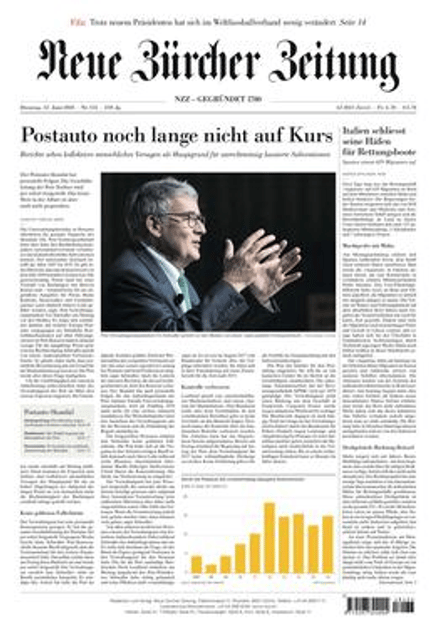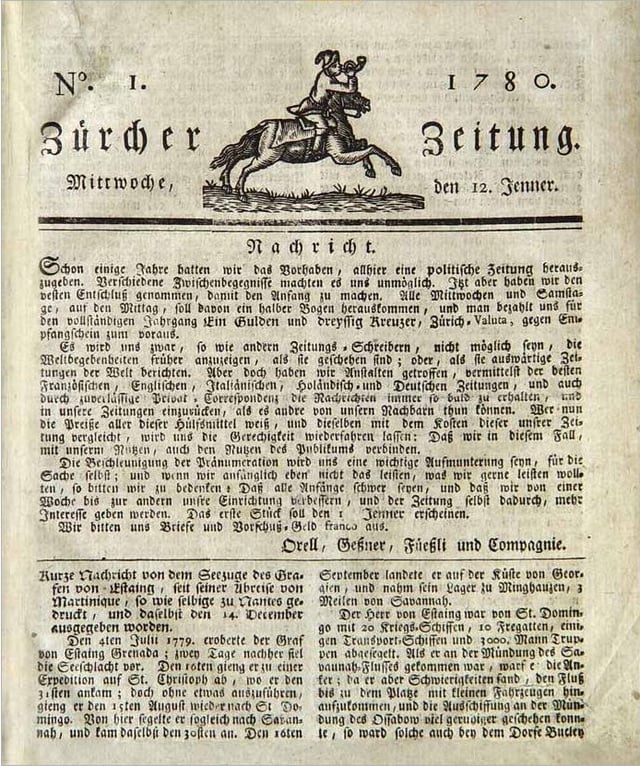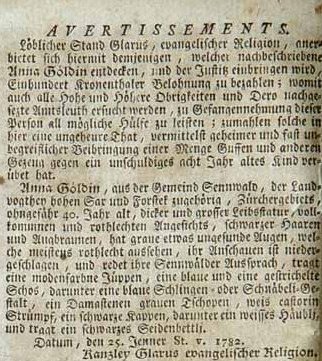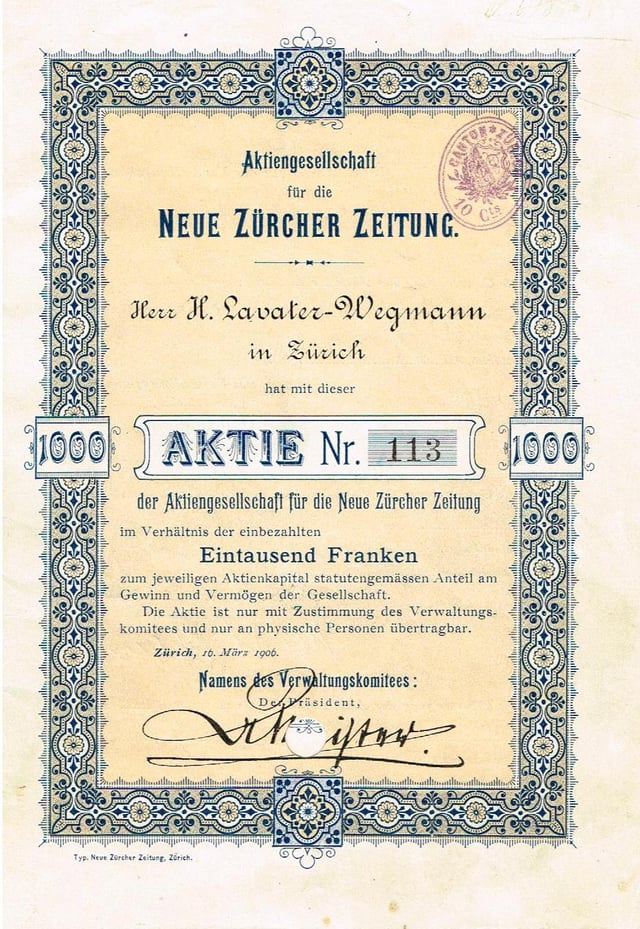Neue Zürcher Zeitung

Neue Zürcher Zeitung

| Type | Daily newspaper |
|---|---|
| Format | Swiss |
| Owner(s) | NZZ Mediengruppe |
| Founder(s) | Salomon Gessner |
| Editor-in-chief | Eric Gujer |
| Founded | 12 January 1780 (1780-01-12) |
| Political alignment | Classical liberalism Liberal democracy |
| Language | German |
| Headquarters | Zürich, Switzerland |
| Circulation | 108,709 (including e-paper, 2014) |
| ISSN | 0376-6829 [20] |
| OCLC number | 698049952 [21] |
| Website | nzz.ch [22] (in German) |

Head office in Zürich, as seen from Sechseläutenplatz
The Neue Zürcher Zeitung (NZZ; "New Journal of Zürich") is a Swiss, German-language daily newspaper, published by NZZ Mediengruppe in Zürich.[1] The paper was founded in 1780. It has a reputation as a high-quality newspaper and as the Swiss newspaper of record. The NZZ is known for its objectivity and detailed reports on international affairs.[2]
| Type | Daily newspaper |
|---|---|
| Format | Swiss |
| Owner(s) | NZZ Mediengruppe |
| Founder(s) | Salomon Gessner |
| Editor-in-chief | Eric Gujer |
| Founded | 12 January 1780 (1780-01-12) |
| Political alignment | Classical liberalism Liberal democracy |
| Language | German |
| Headquarters | Zürich, Switzerland |
| Circulation | 108,709 (including e-paper, 2014) |
| ISSN | 0376-6829 [20] |
| OCLC number | 698049952 [21] |
| Website | nzz.ch [22] (in German) |
History and profile

Zürcher Zeitung, no. 1 (1780).

Research notice published for Anna Göldin accused of witchcraft in the Zürcher Zeitung on 25 January 1782.

Registered share of the AG für die Neue Zürcher Zeitung, issued on 16 March 1906.
According to Peter K. Buse and Jürgen C. Doerr many prestige German language newspapers followed its example because it set "standards through an objective, in-depth treatment of subject matter, eloquent commentary, an extensive section on entertainment, and one on advertising."[6]
Aside from the switch from its blackletter typeface in 1946, the newspaper has changed little since the 1930s. Only since 2005 has it added color pictures, much later than most mainstream papers. The emphasis is on international news, business, finance, and high culture. Features and lifestyle stories are kept to a minimum.
The appointment of Eric Gujer as editor-in-chief in 2015 and René Scheu as head of the feature section in 2016, as well as almost half of all contributing editors leaving the newspaper between 2015 and December 2017, marked a noticeable shift to the right, according to critics.[8]
The NZZ conducted an interview with climbing legend Reinhold Messner when the famous Swiss climber Ueli Steck died during a warm-up climb at Mount Everest in 2017.[9]
Circulation
In 1997, the Neue Zürcher Zeitung had a circulation of 162,330 copies.[10] Its circulation was 169,000 copies in 2000.[11] The circulation of the paper was 166,000 copies in 2003.[12] The 2006 circulation of the paper was 146,729 copies.[13] Its circulation was 139,732 copies in 2009.[14] In 2010 the paper had a circulation of 136,894 copies.[1]
Weekend edition
NZZ am Sonntag was awarded the European Newspaper of the Year in the category of weekly newspaper by the European Newspapers Congress in 2012.[15]
Archives
In 2005, the complete run of the newspaper's first 225 years was scanned from microfilm. A total of two million images comprising seventy terabytes, and its Blackletter type was scanned – using optical character recognition – at a total cost of €600,000 (or €0.30 per image). The result is a searchable digital archive, only publicly accessible on site.
The digitization was carried out by an institute of the German research organization Fraunhofer Society – the Institute for Media Communication (since 2006, the Fraunhofer Institute for Intelligent Analysis and Information Systems), headquartered in Sankt Augustin, North Rhine-Westphalia.[16]
NZZ Libro
NZZ Libro is the book publisher of the Neue Zürcher Zeitung (NZZ). Books have been published since 1927; since 1980, the publishing house has been run as a separate profit centre. Since 2006 the publishing house has been operating under the name NZZ Libro. The publishing programme of specialist and non-fiction literature includes, among other things, political, cultural, historical and economic books, as well as biographies and illustrated books, predominantly with a Swiss reference.[17]
Award
The Neue Zürcher Zeitung was the recipient of the 1979 Erasmus Prize.[18]
See also
List of newspapers in Switzerland